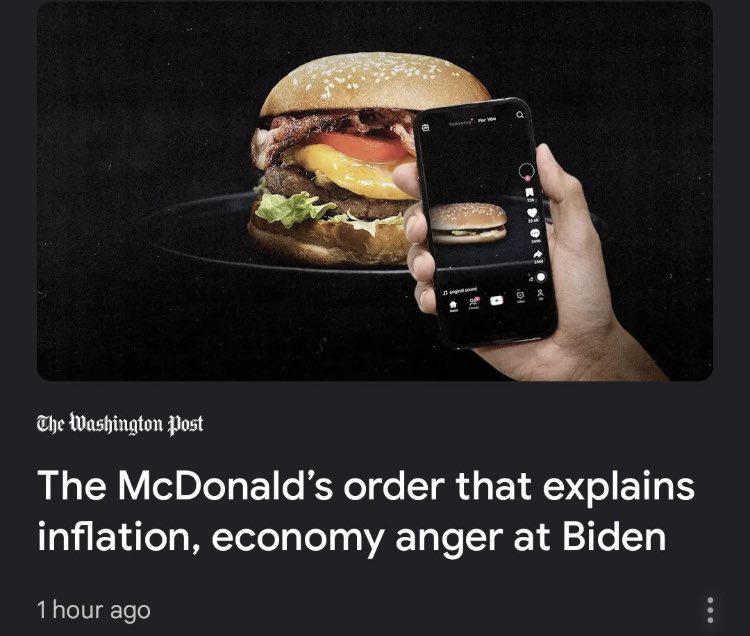As some Democrats fear social media is exaggerating economic problems, the White House faces a crucial choice on election strategy
On Dec. 20, 2022, Topher Olive went to a McDonald’s in the town of Post Falls, Idaho, and ordered a limited edition “smoky” double quarter pounder BLT with fries and a Sprite. The meal cost $16.10, and he posted the receipt on TikTok.
Even though he had ordered a novelty item, Olive’s video about a $16 McDonald’s order went viral, racking up hundreds of thousands of views...
[...]
One anomalous price from one store in Idaho 11 months ago was ripping through people's social media feeds as if it explained the entire economy. One Democratic official, who spoke on the condition of anonymity to describe private conversations, said: "What are we supposed to do, tell the president or Chuck Schumer to send a tweet saying, 'Hey, most Big Macs aren't that expensive?' It would look ridiculous." A spokesperson from McDonald's did not return a request for comment.
Will Stancil has some fame on Twitter but he turned it to crank and a nut. The last ~6 months he's been punching left like an insane person. I'm surprised he's managed to get quoted in a major newspaper. But then again - his entire shtick for years has been that young people don't know anything and their brains are poisoned by the media - particularly Tiktok.
Will Stancil, a research fellow at the Institute on Metropolitan Opportunity, said the problem goes far beyond TikTok, pointing out the media also focuses disproportionately on negative news. He said that Republican voters turned on the economy as soon as Biden was elected — hardly a sign of underlying conditions.
It is not a conspiracy theory, Stancil argued, to believe the media ecosystem has warped people's views, particularly given how hard it is to assess nationwide economic conditions from one's own personal experience.
"This has a lot to do with the social and media environment that young people live in. People's ideas of things like the economy — which they can't experience directly — are being constructed from what they're hearing from other people. It's being constructed from what you hear from your peers, trusted sources, and the news media, and so forth," Stancil said, arguing that while people can have their own experiences of the economy, they cannot individually form a comprehensive picture of it. "People begin to incorporate that into their worldview."

Now, when you're willing to grow up, act like adults, and form your entire worldview around reliable metrics like GDP and...well just GDP actually, then we can talk."
this comment hit the nail exactly on the head. any time i try to argue with someone it's always this.